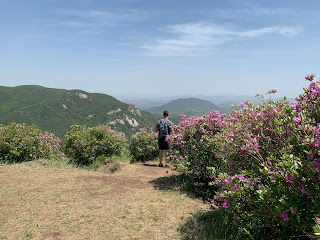I have heard great things about the Azalea Festival in Hwangmaesan. It started in 1997 as an effort by local residents to preserve the azalea fields. The mountain has been the filming place for several movies, and in 2012 it was included in CNN Travel's list of '50 Beautiful Places to Visit in Korea.' It was a must-see on my list.
We very strategically planned the timing of this trip to find the flowers in their full blooming-glory. The guys had a random Wednesday off for Children's Day. My gift to my children was to not make them come along to take a hike to look at flowers--two things at the bottom of their must-see list.
Korea is the Land of the Morning Calm; not a lot starts until late morning. Knowing full well that the mountain would be full of spectators, we left early in the morning to avoid crowds. The festival was cancelled, because, Covid. It took us a little longer to get there than we planned, and people were out a lot earlier than usual.
As it turned out, we did not avoid crowds. It was the busiest mountain hike I have been on since being here. We weren't even positive we were in the right place. The view at the parking lot did not show any promise of azaeleas.We just followed the crowd and hoped for the best.
I quickly dubbed this the Waterfall Hike.



 Shortly after that I decided to call it the Waterfall/Rock Stack Hike.
Shortly after that I decided to call it the Waterfall/Rock Stack Hike.








 Shortly after that I decided to call it the Waterfall/Rock Stack Hike.
Shortly after that I decided to call it the Waterfall/Rock Stack Hike.




Suddenly there was a clearing, and like magic, pink appeared.




 The Hwangmaesan County Park Royal Azalea Habitat hosts the largest amount of azaleas in the country. Even though there was no festival this year, the park was voted one of the top 100 Korean destinations for 2021-2022 by the Korean Tourism Organization.
The Hwangmaesan County Park Royal Azalea Habitat hosts the largest amount of azaleas in the country. Even though there was no festival this year, the park was voted one of the top 100 Korean destinations for 2021-2022 by the Korean Tourism Organization. 
 There is a legend about this mountain and a Buddhist monk named Muhak. While training on the mountain, his mother cut her foot on thorns and she was frightened of walking through the silver grasses flowing in the wind because of the thorns and snakes.
There is a legend about this mountain and a Buddhist monk named Muhak. While training on the mountain, his mother cut her foot on thorns and she was frightened of walking through the silver grasses flowing in the wind because of the thorns and snakes. Therefore, Muhak prayed to a god of Hwangmaesan for 100 days regarding his mother. After his prayers, snakes were not allowed to live on the mountain and thorns did not take root there. Since then, it is said that Hwangmaesan symbolizes children's duty to honor their parents. So it kind of did fit in with Children's Day.
Therefore, Muhak prayed to a god of Hwangmaesan for 100 days regarding his mother. After his prayers, snakes were not allowed to live on the mountain and thorns did not take root there. Since then, it is said that Hwangmaesan symbolizes children's duty to honor their parents. So it kind of did fit in with Children's Day.





 The Hwangmaesan County Park Royal Azalea Habitat hosts the largest amount of azaleas in the country. Even though there was no festival this year, the park was voted one of the top 100 Korean destinations for 2021-2022 by the Korean Tourism Organization.
The Hwangmaesan County Park Royal Azalea Habitat hosts the largest amount of azaleas in the country. Even though there was no festival this year, the park was voted one of the top 100 Korean destinations for 2021-2022 by the Korean Tourism Organization. 
 There is a legend about this mountain and a Buddhist monk named Muhak. While training on the mountain, his mother cut her foot on thorns and she was frightened of walking through the silver grasses flowing in the wind because of the thorns and snakes.
There is a legend about this mountain and a Buddhist monk named Muhak. While training on the mountain, his mother cut her foot on thorns and she was frightened of walking through the silver grasses flowing in the wind because of the thorns and snakes. Therefore, Muhak prayed to a god of Hwangmaesan for 100 days regarding his mother. After his prayers, snakes were not allowed to live on the mountain and thorns did not take root there. Since then, it is said that Hwangmaesan symbolizes children's duty to honor their parents. So it kind of did fit in with Children's Day.
Therefore, Muhak prayed to a god of Hwangmaesan for 100 days regarding his mother. After his prayers, snakes were not allowed to live on the mountain and thorns did not take root there. Since then, it is said that Hwangmaesan symbolizes children's duty to honor their parents. So it kind of did fit in with Children's Day.



















































No comments:
Post a Comment